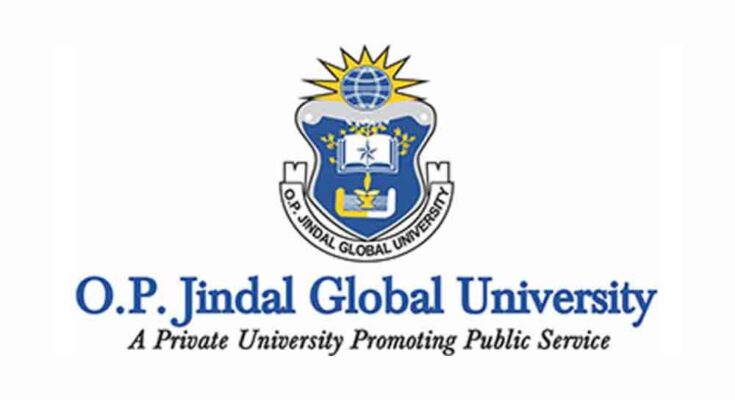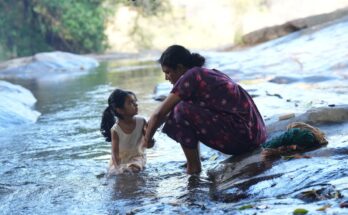EDUCATION AND ENVIRONMENT MINISTERS LAUD JGU AS INDIA’S 1st UNIVERSITY TO RELEASE
Sonipat, 25 October, 2021:
On the occasion of the United Nations Day 2021, O.P. Jindal Global University released the first-of-its-kind Impl ementing the Sustainable Development Goals: Role of Universities and Civil Society in Protecting the Environment Re port, mapping its compliance towards the 17 Sustainable Development Goals (SDGs) set by the United Nations. Se tting a global benchmark, JGU has become one of the first universities to fully commit to and implement the SDGs on its campus, despite the challenges posed by the COVID-19 pandemic.
The report was launched in the presence of Shri Dharmendra Pradhan, Union Minister of Education, Shri Ashwini Kumar Choubey, Hon’ble Union Minister of State for Environment, Professor (Dr.) Pankaj Mittal, Secretary General Association of Indian Universities, Shri Atul Bagai Head of Country Office United Nations Environment Programme and Mr. Sudhir Mishra, Founder & Managing Partner, Trust Legal, Advocates & Consultants.
The UN SDGs include affordable and sustainable energy, combating climate change, eradicating hunger, education, health, and gender equality. To demonstrate its commitment towards the implementation of the SDGs, JGU engag ed in an independent assessment of its campus and initiatives to get a transparent and fair view of the university’s progress in compliance with the UN SDGs. A cohort of 12 assessors from the environment and legal fields including The Energy and Resources Institute (TERI), Trust Legal, Advocates & Consultants and Mazars Business Advisors Pv t. Ltd., Trust Legal, Advocates & Consultants carried out a rigorous evaluation of the university’s processes ranging from the university’s energy consumption to water management systems and community engagement initiatives.
Shri Dharmendra Pradhan, Union Minister of Education, Government of India, said congratulated JGU on the launch of the Report and said, “The launch of the report comes at an opportune moment when the world leaders including Prime Minister Shri Narendra Modi will attend COP26 meeting at Glasgow next month. Diverse voices in the form of reports, scientific inquiry, and debates will only enrich our collective knowledge in protecting the health of the planet. The National Education Policy 2020 is fully aligned to the UN’s Sustainable Goals and aims to nurture youth with global outlook and sensibility with capabilities that can help them face the global challenges of the 21st century. It is built on the foundational pillars of access, equity, quality, affordability and accountability. childhood care to quality education for the students in the remotest corner of the country. Universities have responsibility to contribute not only to the local communities but also to the global community. This is primarily because they have the capacity to help students develop a holistic understanding of how a wide range of local, national and global challenges can be addressed. They help students in developing the spirit of scientific inquiry, curiosity and entrepreneurship needed to produce concrete and innovative solutions to tackle these challenges. The role of university in the road to the sustainable development is crucial. It becomes imperative that the universities devote time and resources to create an SDG ready generation that remains focused on the mission to achieve sustainable development.”
Shri Ashwini Kumar Choubey, Hon’ble Minister of State for Environment, Ministry of Environment, Forest & Climate Change, Government of India said, “I congratulate the Vice Chancellor of JGU that under his leadership, JGU is not only committed to excellence in education but has also demonstrated a vision to implement the UN-SDG goals at the university. Educational institutions can play a pivotal role in informing young people and create awareness about the steps needed to protect and preserve the environment. India has a long tradition of protecting nature and environment. As our Vedas say, if you protect nature, nature will protect you. It is our duty to respect the environment for human survival. It is an achievement for JGU for conducting such a study on UN-SDG goals and its aim to handle the challenges of carbon emissions to pollution, flora and fauna and depleting natural resources.”
Professor (Dr.) C. Raj Kumar, Founding Vice-Chancellor of O.P. Jindal Global University said, “The Sustainability Deve lopment Report 2021 demonstrates our commitment to creating a green and socially-conscious campus and to have a transparent and fair view of our progress in our compliance with the UN SDGs. This comprehensive assessment was conducted on our processes ranging from our energy consumption to water management systems to community engagement initiatives. While the COVID-19 pandemic presented challenges as well as opportunities for reaching the SDGs, JGU has moved towards a healthier and safer environment by implementing the SDGs within its campus. By tak ing efforts to implement the UN-SDGs, JGU has shown the way to other educational institutions, how futuristic, social and environmental commitments are met. Even in the past, JGU has demonstrated its commitment to protecting our environment by gaining top rankings in the Swachh Campus Rankings of Higher Educational Institutions conducted by the Ministry of Education. The SDG Report 2021 on JGU is a culmination of outstanding efforts by TERI, Trust Legal and Mazars for creating a new dimension for promoting sustainable development. This has the potential to transform the future and help address the challenges of climate change by brining universities to the centre of knowledge creation, research, experiential learning, innovation and broader engagement with the youth.”
Setting the context for why universities must play a role in implem enting SDGs, Shri Atul Bagai Head, Country Office United Nations Environment Programme said, “Today, we are all facing ‘the triple plan etary crisis’. It is the crisis of climate, the crisis of nature, and the crisis of pollution and waste. The crisis is very clearly a consequence of the economic path that we have pursued along with resource-intensive processes, consequent lifestyle changes due to economic growth and urbanisation. This has led to 60% of our ecosystem being damaged in the last few decades and a real prospect of increase of three degrees Celsius in global temperatures by the end of the century especially if we continue with our emissions. It is a rare feat for a university not only in south Asia or in Asia Pacific to have come up with such a report. It’s an extremely laudable effort which will be a game-changer. We should make it available to every university in the country.”
O.P. Jindal Global University has created a sustainable model with solar power generation by contributing exc ess power to the grid. The university has aimed in instituting zero-net emission policies and investing in on-cam pus renewable energy production by developing long term resource efficiency and management plans. Close to 55% of university’s campus is under a green cover. A green area around the university helps to arrest the effects of particulate matter and gaseous pollutants in the area besides playing a major role in environmental cons erva tion efforts. The university has also set up the Jindal School of Environment and Sustainability to ensure that it creates innovation and young leadership to combat climate change and its impact. It also provides interdi scip linary education across other schools to ensure that there is adequate awareness on this important subject ac ross the entire university.
Professor (Dr.) Pankaj Mittal, Secretary General Association of Indian Universities said, “We do realise that India is placed at 120th rank in implementation of SDG 2021 and this calls for an urgent action from all sectors of the society. Due to their unique position in society, the higher education institutions have immense scope and pote ntial to contribute towards realising all 17 SDGs and thereby accomplishing them. I feel that rather realising the SDGs without the cooperation of the higher education sector is quite an impossible task. In India, there is a lot of tacit contribution of HEIs in implementing SDGs, but there is no documented data on the same.”
Mr. Sudhir Mishra, Founder & Managing Partner, Trust Legal, Advocates & Consultants who was the lead kno wl edge partner for the commissioning of the SDR called the release of this voluntary report a watershed mo ment in the history of climate change movement in India. For him this single bold step by India’s no one private unive rsity on sustainability will lead to complete change of the narrative as many campuses will become the symbol of hope to showcase how they conserve water, how they dispose waste, how they nurture trees, how they reduce carbon foot prints, and how they engage with local communities. Mr. Mishra observed, “The Sustainable Deve lop ment Report 2021 on O.P. Jindal Global University is unique initiative promoted by India’s Number One Ranked Private University as a part of its social responsibility. We were delighted to work on this initiative as the university ensured com plete intellectual autonomy, operational freedom and editorial independence in preparing the report. The collective cont ribution of the teams from TERI, Trust Legal and Mazars provided a comprehensive assessment of JGU’s commitment to the implementation of the SDG goals and other compliance related matters. The report is a comprehensive 100-page doc ument that identifies every key aspect of SDGs and its relationship to the governance and functioning of JGU. The importance of this report and the initiative was demonstrated by the fact that the Education Minister and Environment Minister of India were present at the launch of the SDR 2021 of JGU.”
Prof. Dabiru Sridhar Patnaik, Registrar, O.P. Jindal Global University (JGU) gave the concluding address and sa id, “We have taken a step in the right direction towards promoting the significance of UN-SGDs by progressively under taking activities to meet the goals in consonance with the National Education Policy. I am also happy to report that most recently we have opened a student chapter of the International Green Building Campus under the aegis of the Confe der ation of Indian Industry. A very futuristic and a definite step has been taken to create a green campus.”





